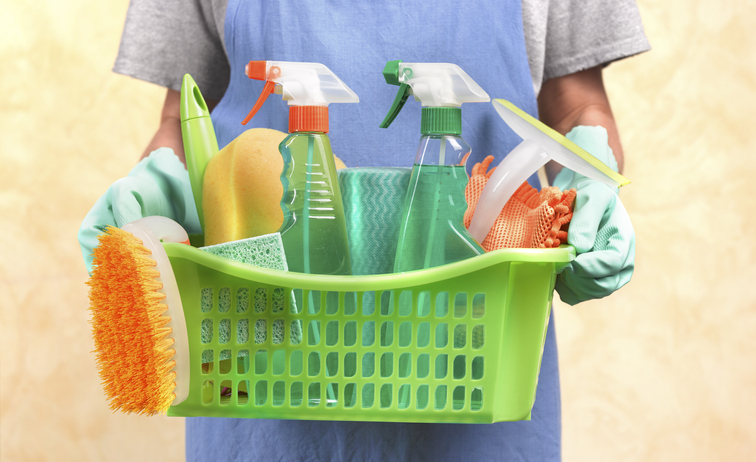Don’t Hate Your Household Chores. They May Help Fight Cancer

By Joy Stephenson-Laws, JD, Founder
As a kid, you probably didn’t like doing your chores. As an adult, you still most likely don’t enjoy them, however, what if I told you that doing these household tasks may be lowering your risk of developing different types of cancer? I bet this will change your perspective!
Incidental Vigorous Activity.Let’s call it “IVA” for short. IVA is essentially all the “exercise” people do when they do their chores such as bringing all those heavy groceries inside from the car, walking up and down the stairs to do laundry, sweeping the floors and wiping down counters and mirrors (any kind of active housework). Although not really a chore, chasing after kids is also considered IVA. For me, gardening would be a part of my regular IVA. Doing errands on foot and any activity at work (perhaps you have a job that requires a lot of walking or lifting) are also IVAs.

(For many of us, however, having jobs that require hours of sitting makes it difficult to maintain an active lifestyle. Check out this pH blog on ways to be proactive about combatting this).
A recent study published by JAMA Oncology, involving 22,398 non-exercising adults, found evidence suggesting that vigorous intermittent lifestyle physical activity (VILPA) reduces the risk of cancer. The results revealed that just 3.4 to 3.6 minutes of VILPA a day was linked to a 17 to 18 percent reduction in total incident cancer risk compared to no VILPA.
“A median daily VILPA of 4.5 minutes was associated with a 31% to 32% reduction in physical activity–related cancer incidence,” according to the study report published by JAMA.

There are certain types of cancer whose development have been connected to a lack of physical activity. I suppose one could argue that any cancer can be linked to a lack of movement, however, breast, lung, liver and bowel cancers for example have been singled out as cancers that people are more likely to get if they are not physically active. What I love about this particular study is that it identified 13 cancer sites associated with low physical activity (PA) and focused on these sites to see how VILPA made an impact. As mentioned, the researchers saw a 31 to 32 percent reduction in physical activity-related cancers with a median daily VILPA of 4.5 minutes.
This research reminds me of what I learned about the world’s five blue zones, areas of the world where in general people are living healthily well into their 90s and even 100s. One of the main habits of these extraordinarily healthy people is to move naturally through labor and walking.
This is Not All to Say Ditch the Gym!
Being intentional about working out by going to the gym, lifting weights or completing a workout video on YouTube are all great ways to help yourself maintain a healthy, active lifestyle. The purpose of this information about incidental physical activity, I think, is to inform people there is value in those never-ending household tasks beyond just having a clean home or clean clothes to wear. It could have a profound effect on your health.
Keep in mind, however, that 150–300 minutes of moderate intensity or 75–150 minutes of vigorous intensity activity a week is ideal for optimal health.
“Furthermore, vigorous incidental physical activity is a promising avenue for cancer prevention among people unable or unmotivated to exercise in their leisure time,” reports this Medical Xpress article that discusses the study.
Again, I will stress the importance of intentional movement, however, sometimes issues such as depression and physical pain make this difficult for some. I think this knowledge about incidental activity is also motivation for elderly people to try to continue to do tasks around the house. Not only will this help with maintaining independence, but it may also fight cancer. As always, happy and healthy longevity is the ultimate goal.
I also highly recommend thinking about how you can add in movement relatively easily. For example, take the stairs instead of the elevator. Choose that parking spot that is furthest away from the door. Do a walking meeting instead of sitting down. There are so many small changes one can make to make a big difference.
Nutrition is Invaluable.I cannot stress this enough. Cleaning up your diet is even more important than cleaning up your home. One study found evidence suggesting that poor diet is tied to five percent of all cancer cases. That is huge, but the good news is that diet is within our control. Avoid processed and ultra-processed foods. Instead, maintain a diet rich in whole, nutrient-dense dense foods such as fruits, vegetables and legumes.
Testing is Key.It is also good to know where you stand nutritionally in order to help yourself ward off cancer and other illnesses. Even if you are eating healthily, you could still be nutritionally imbalanced. One solution is a comprehensive nutrient test which will determine if you have any deficiencies or imbalances. If you do (and most of us do), a competent healthcare professional can work with you regarding making the necessary dietary changes and recommend quality supplements if necessary.
I hope this all makes that laundry or grocery haul perhaps not so dreadful. Sometimes it really is about our perspective. Let's all commit to move our bodies more, take care of our homes and take care of ourselves.
Enjoy your healthy life!
Disclaimer: This article is not intended to provide medical advice. Please consult with your doctor or another competent healthcare practitioner to get specific medical advice for your situation.
The pH professional health care team includes recognized experts from a variety of health care and related disciplines, including physicians, attorneys, nutritionists, nurses, and certified fitness instructors. This team also includes the members of the pH Medical Advisory Board, which constantly monitors all pH programs, products, and services. To learn more about the pH Medical Advisory Board, click here.







